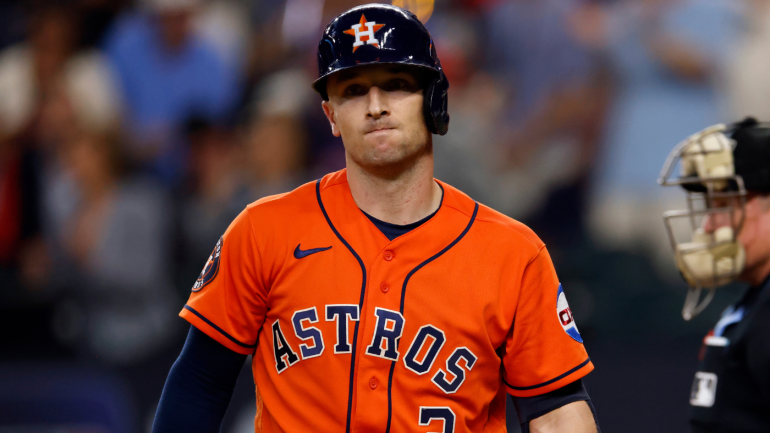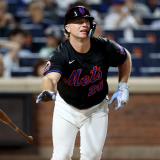
What's next for Astros? Four reasons why loss vs. Rangers could be beginning of end for team's AL dynasty
The Astros are a fixture late in the postseason every year -- is that about to change?

The 2023 Houston Astros came up short in their quest to secure a third consecutive trip to the World Series. Houston was blown out on Monday night against the Texas Rangers in Game 7 of the American League Championship Series. The Astros held a 3-2 lead in the best-of-seven series and hosted both Games 6 and 7. Nevertheless, the Astros will now head into the offseason, where they'll attempt to reinforce their roster before gearing up for a run at making their eighth ALCS in a row.
The Astros' constant presence in MLB's version of the final four has us wondering: just how much longer can they keep this up? After all, the last time the Astros were eliminated prior to the start of the ALCS, "The Accountant" was the top grossing film and The Chainsmokers had the No. 1 song.
Below, we've identified four reasons that the Astros' dynastic reign might be closer to the end than realized.
1. Organizational disarray
The Astros celebrated their World Series title in unusual fashion last fall by firing general manager James Click and assistant general manager Scott Powers. The Astros later replaced Click by hiring Dana Brown from the Atlanta Braves, but that came after the organization made multi-year commitments to reliever Rafael Montero and first baseman José Abreu -- deals seemingly orchestrated by owner Jim Crane and Houston's remaining braintrust.
While it's impossible to know for sure, Click likely would not have signed off on either deal given sabermetric principles concerning relievers and aging right-right first basemen. Both players had disappointing seasons, with Montero sporting a 5.08 ERA and Abreu an 87 OPS+. (Abreu performed well in the postseason, suggesting that he's not yet done as a contributor.)
Crane's involvement in baseball decisions and Houston's ongoing front-office turnover are common discussion topics around the league. A new round of chatter began recently, when the Astros announced two more departures, in assistant general manager Bill Firkus and farm director Sara Goodrum. (Manager Dusty Baker, whose contract expires at the end of the month, could be the next to go.)
Various front-office sources, including some who worked in Houston during these glory years, have expressed bewilderment that Crane would overhaul an organization that consistently produced results. The belief is that Crane grew emboldened after being a driving force behind the original Justin Verlander trade. He's since grown more dependent on former big-league players Jeff Bagwell and Reggie Jackson, leading to a distaste for the overly analytical approach employed both by Click and his predecessor Jeff Luhnow.
Bagwell seemed to suggest as much publicly last fall. "This game is played by humans, man. It's not played by computers," he told the Houston Chronicle.
Whatever the exact cause and the exact effect of the turnover, one rival talent evaluator predicted that a book will be written about this period in Astros history. The theme? How hubris precipitated the self-sabotage of a dynasty.
2. Aging core and contractual matters
The passage of time could soon impact the Astros by eroding their talent base in two ways: 1) depleting older players of their skills and 2) enabling younger players to leave through free agency.
The first part is simple enough. Past statistical research indicates that most players begin to decline after their 30th birthday. Next season will mark Verlander's age-41 season; Abreu's age-37 season; and Jose Altuve's age-34 season. It's not insulting to suggest that some decline could be in order -- even from future Hall of Fame types like Verlander and Altuve.
As for the other part, Altuve and Alex Bregman will both qualify for free agency after the 2024 campaign. Brown has been open -- arguably too open, from a negotiating standpoint -- in saying he wants each to finish their careers with the Astros. Those extension talks will likely be revisited this winter.
It stands to reason that Altuve and Bregman's combined asks will eclipse $60 million, or roughly what they made this season. The Astros have regularly fielded payrolls around $180 million, meaning those two players could be responsible for more than a third of that total on their own heading deeper into their decline phases. The challenge for Brown is to keep both while maintaining the flexibility he'll need to a) add external players and b) retain young players over the coming years. For instance, lefty Framber Valdez and outfielder Kyle Tucker are scheduled to hit the open market in winter 2025.
3. Weak farm system
Brown has long garnered a reputation as a shrewd talent evaluator. After all, he was the Braves' scouting director when they unearthed the likes of Spencer Strider and Michael Harris II outside of the first round. Sources familiar with the process have indicated that Brown was also the driving force behind the Tyler Matzek signing, suggesting that he's willing to look everywhere for talent (Matzek was signed by Atlanta in 2019 out of the American Association, where he was playing for the Texas AirHogs).
Brown will need to work his magic to improve Houston's below-average farm system. The Astros' lack of promising youngsters should come as no surprise. Years of low or forfeited picks and win-now trades tend to make it difficult to foster a good farm system. Brown and company thinned their ranks more at the deadline, trading away two of their best youngsters (outfielders Drew Gilbert and Ryan Clifford) as part of the Verlander reunion trade.
Of course, there are other means to acquire talent -- a savvy trade or waiver claim here and there works fine. But an aging core that continues to grow more expensive by the winter requires a steady stream of league-minimum contributors. It's on Brown to ensure the Astros maintain that flow.
4. Changing tides
If this postseason showed anything, it's that the times are changing in the American League.
The Rangers clearly have an impressive core in place. They should continue to buttress it ahead of next summer, both externally and with the promotion of talented young outfielder Wyatt Langford. The Baltimore Orioles have arrived thanks to their own collection of talented homegrown hitters -- a group that should keep them relevant for as long as their cost-averse ownership allows. You can never count out the rest of the AL East from making noise. The AL Central still exists. And so on.
The Astros won the AL West this season only through a tiebreaker. Had they not, and had they played in the AL Wild Card Series, it's possible they would have suffered an early exit -- not because of a character or talent failing, but because that's life when it comes to three-to-five-game series.
That's the beauty and the agony of postseason baseball. You can spend all winter scheming and all summer winning, but once October rolls around, there's no guarantee any of it will matter. The Astros have proven to be an exception for longer than anyone, including them, could have imagined. At some point, though, that will change.


















